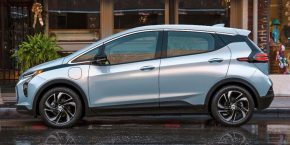
NHTSA announced that it is looking into Chevy Bolt EV over a potential issue that could lead to a battery fire.
The National Highway Traffic Safety Administration (NHTSA) confirmed this week that its Office of Defects Investigation (ODI) is launching an investigation into the Chevy Bolt EV over three instances of fires that originated without impacts from accidents.
Two of them were reported to NHTSA:
The Office of Defects Investigation (ODI) of the National Highway Traffic Safety Administration (NHTSA) has received two Vehicle Owner Questionnaires (VOQs) regarding a model year (MY) 2018 and a MY 2019 Chevrolet Bolt EV and alleging that the vehicles caught fire under the rear seat while parked and unattended.
After getting the two reports, the agency found a third electric car, a 2017 Bolt EV, with a similar burn pattern.
They reported:
In the three cases identified, fire damage appeared to be concentrated in the EV battery compartment area with penetration into the passenger compartment from under the rear seat. The root cause of these fires is unknown. One of these incidents, ODI 11230072, reported smoke inhalation injuries.
They confirmed that they opened a “Preliminary Evaluation” with the goal to “assess the scope, frequency, circumstances, and safety consequences of the alleged fires.”
The investigation affects all Chevy Bolt EVs produced between 2017 and 2020 — about 77,000 vehicles.
[scribd id=480172963 key=key-qtdfuojWXTqdOKFNqYSs mode=scroll]
NHTSA’s investigation comes as Hyundai is reportedly preparing to recall all of its Kona Electric vehicles over a potential risk of fire.
In Hyundai’s case, the blame is being put on Hyundai by some and LG Chem, the battery cell supplier, but others.
LG Chem is also the battery cell supplier for the Chevy Bolt EV.
Electrek’s Take
It’s not a good look for EVs with the Chevy Bolt EV news right after the Hyundai Kona Electric battery fire problem.
But there’s no statistical evidence that shows electric vehicles catching on fire at a higher rate than gasoline-powered vehicles. There are over 200,000 gasoline-vehicle fires reported every year in the US alone.
However, since electric vehicles represent an emerging technology, there’s an abundance of caution around the technology and a lot of interest when incidents like those happen.
If anything, it’s leading to EVs becoming even safer as automakers are doubling on their efforts to build safe battery packs.
FTC: We use income earning auto affiliate links. More.


Comments